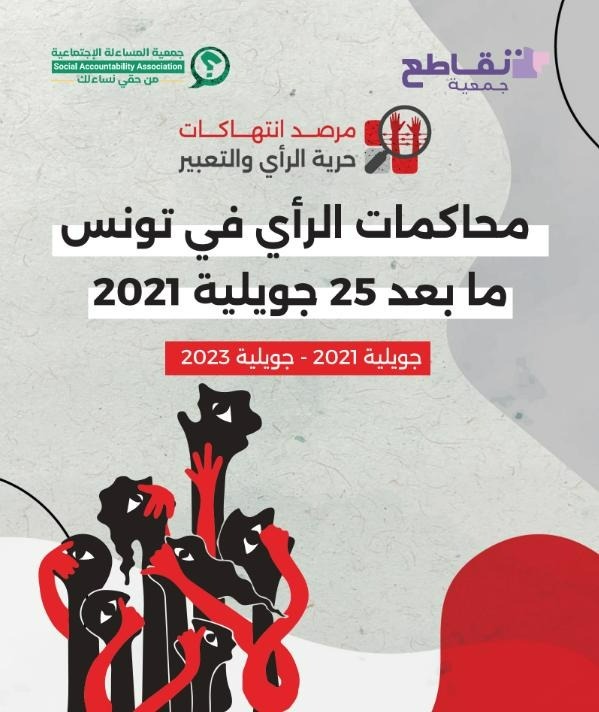To view the report:Opinion trials in Tunisia after July 25, 2021
Tunis, October 4, 2023
In the framework of the Observatory for Violations of Freedom of Expression and Opinion, the associations “Taqatof for Rights and Freedoms” and “Social Accountability Association” issued a monitoring report on October 3, 2023 entitled “Trials of Opinion after July 25, 2021.” The report addresses trials of opinion in the period from July 2021 to July 2023. During this period, Tunisia witnessed a number of trials of opinion, targeting citizens from different categories, politicians, journalists, lawyers, and unionists, for expressing their opinion by publishing posts on social media or media statements.
This report refers to the trials of opinion that Tunisia has witnessed since July 25, 2021 to July 2023, which targeted in particular all the critical and opposition voices to the system of President Kais Saied to be tried on the background of their exercise of the right to freedom of expression. This takes us back to a state of prior censorship of freedoms and human rights violations. The Observatory for Violations of Freedom of Expression and Opinion monitored 47 cases of violations ranging from arbitrary arrests to summons for questioning only and trials under different laws, including Decree No. 54. These judicial prosecutions have affected politicians, civil activists, journalists, lawyers, and other citizens who expressed their views on a number of current political issues that Tunisia is experiencing, which explains the rise of this type of trials over a period of three years.
The monitored trials of opinion were collected in an open database for the public. The report aims to point out the extent to which the Tunisian authorities target all political opponents, activists, and even journalists who are carrying out their media role in accordance with the rights guaranteed to them by law, and their persecution and monitoring through the judiciary, which explains the rise of trials of opinion in Tunisia after July 25, 2021. The number of cases mentioned in the report does not represent an exhaustive list of all cases related to freedom of expression and the violations committed by the Tunisian state against its citizens.
The report ends with a number of recommendations that were directed to:
The Supreme Council for Human Rights and Fundamental Freedoms:
- Reactivate the council, which represents the only supervisory body for rights and freedoms, and amend its decisions in a manner that is in line with democracy and with human rights and freedoms.
- Submit periodic reports to the Tunisian state by adopting the participatory approach based on consultation with all parties as a national institution for the promotion and protection of human rights.
- Conduct consultations with other bodies, judicial or non-judicial, to ensure respect for the right to freedom of expression. (Paris Principles)
- Submit recommendations to the competent authorities, especially by proposing amendments or reforms to laws, regulations, and administrative practices, especially when they are the source of the sanctions faced by petitioners to assert their rights. (Paris Principles)
The Executive Authority:
- Comply with the international human rights treaties that include freedom of expression, to which Tunisia has signed and commits it to protecting these rights for all citizens and residents in the country without discrimination.
- Transparency and monitoring of the performance of the security forces should be enhanced to ensure that they comply with human rights standards.
- The government should work to enhance cooperation between itself, civil society organizations, and international institutions to work together to promote human rights and justice.
- Do not impose unjustified restrictions on the media and freedom of expression.
The Legislative Authority:
- The Committee on Rights and Freedoms in the House of Representatives should review the legislation and legal texts that contain vague and undefined phrases that impose unfair restrictions on freedom of expression.
- Involve civil society and non-governmental organizations in legal amendments to ensure respect for human rights and not to infringe on freedoms.
Civil society:
- Organize awareness campaigns for the community about their rights and how to defend them.
- Stand in solidarity against the violations committed by the Tunisian authorities and defend the right to freedom of expression, which is one of the most important gains that the Tunisian people won during the revolution.
To view the report:Opinion trials in Tunisia after July 25, 2021

